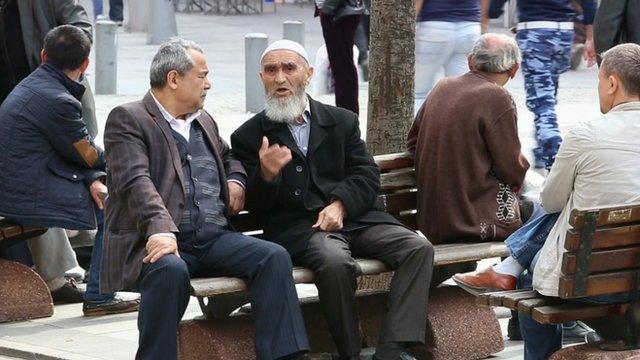China-Turkey relationship strained over Uighurs
- Published
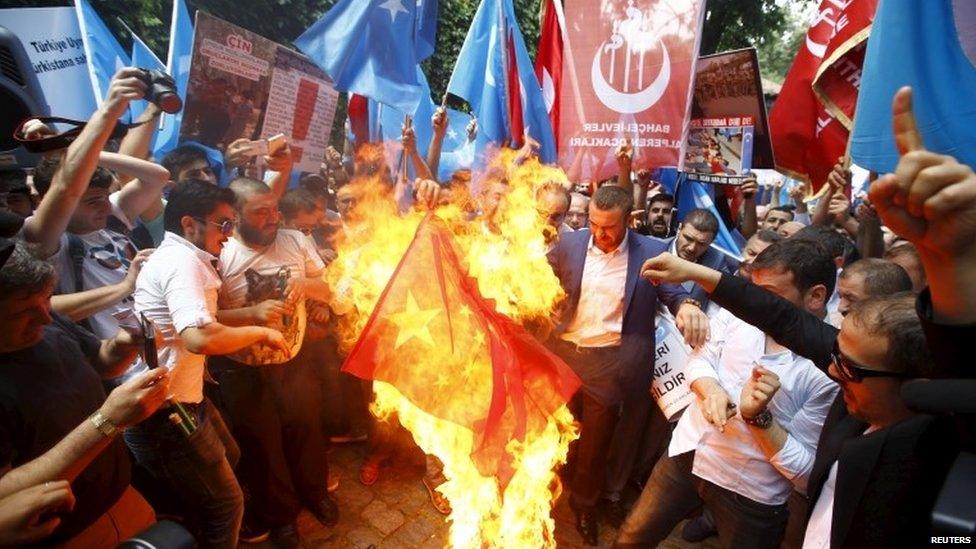
Protests in Turkey have seen Chinese flags being burned
Burnt Chinese flags, attacks on Chinese restaurants, alleged attacks on tourists who were mistaken for being Chinese and protests across the country.
For the last 10 days anti-Chinese sentiment has been on the rise in Turkey.
Turkish Muslims and Uighurs from the far western region of China share ethnicity and have close cultural and religious ties.
The protests started following reports that Uighurs in China had been banned from fasting during the holy month of Ramadan.
Muslims worldwide observe Ramadan, when the faithful abstain from eating and drinking during daylight hours.

Turkish supporters of Chinese Uighurs have been spurred by reports of Ramadan controls in Xinjiang
"Our people have been saddened over the news that Uighur Turks have been banned from fasting or carrying out other religious duties in the Xinjiang region," Turkey's foreign ministry said in a statement last week.
In response, China said it fully respects the freedom of Muslim religious beliefs and the accusations that religious rites had been banned in Xinjiang this Ramadan were "completely at odds with the facts" and exaggerated by the western media.
It said: "No state organ, public organization or individual may compel citizens to believe in religion or no religion. They may not discriminate against religious citizens and non-religious citizens."
Cihan Yavuz's Chinese restaurant, Happy China, was attacked by an angry mob in Istanbul last week.
"People are scared to come here, scared of another attack," he said.
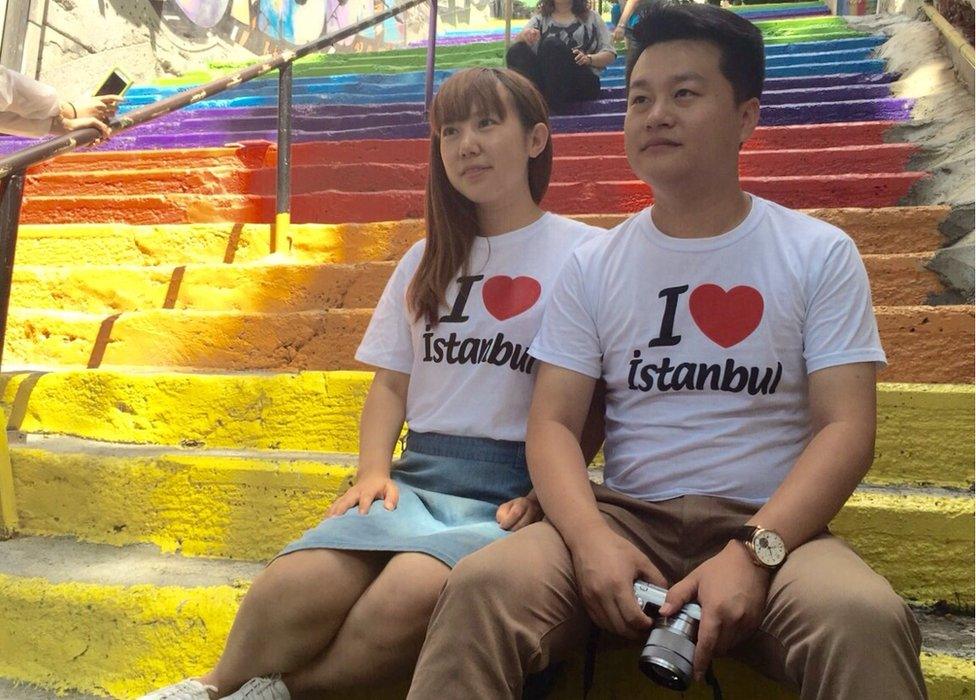
Chinese tourists do not seem deterred from visiting despite rising tension against their country and a travel warning

Cihan Yavuz's Chinese restaurant Happy China was attacked by an angry mob
"If people want to protest the Chinese government, they can hold demonstrations in front of its embassy. It's not right to use violence for the sake of protesting," he said.
There were further reports of disturbances in Istanbul on Saturday as the Grey Wolves - the youth wing of the far right nationalist party MHP - held a march.
Chinese tourist guide Miray Hamit said four or five men with knives attacked a tourist in her group.
"They asked us where we were from and when we said we were Chinese they started hitting one of us.
"A Turkish tourist guide and I intervened to stop the attack. We all got scared. One of us got injured, though nothing serious thankfully. I got hit too," she said.
Miray Hamit thought the attackers were not necessarily affiliated with the Grey Wolves rally and could have just been passing.
'We trust Turkey'
Turkish media though reported a group of Korean tourists believed to be Chinese were attacked during the Grey Wolves' protests, an allegation they deny.
The head of Grey Wolves in Istanbul, Ahmet Yigit Yildirim, alleged the scuffles that took place were actually between the police and protesters and no harm was done to any tourists. He said no complaint was made against them.
"The safety of every tourist coming to our country is our responsibility. We can't tolerate any sort of violence," he said.

The head of the Grey Wolves says tourists were not harmed in its anti-Beijing protest
Police sources were unable to speak to the BBC. However, the Korean consulate in Istanbul said they had not received any complaints or reports of any attacks against Korean citizens in the city.
In the Turkish media the leader of MHP, Devlet Bahceli, hinted at the possibility that a Korean may have been confused with a Chinese.
But Chinese tourists do not seem deterred by the rising anti-China sentiment in Turkey.
"We are aware of what's going on. But we didn't encounter any problems. We trust Turkey. Turkish people have been very friendly to us," tourist Lucky Zhang said.
This week, the Chinese government issued travel advice to its citizens travelling to Turkey and warned them against getting too close to protests or filming them.

Who are the Uighurs?
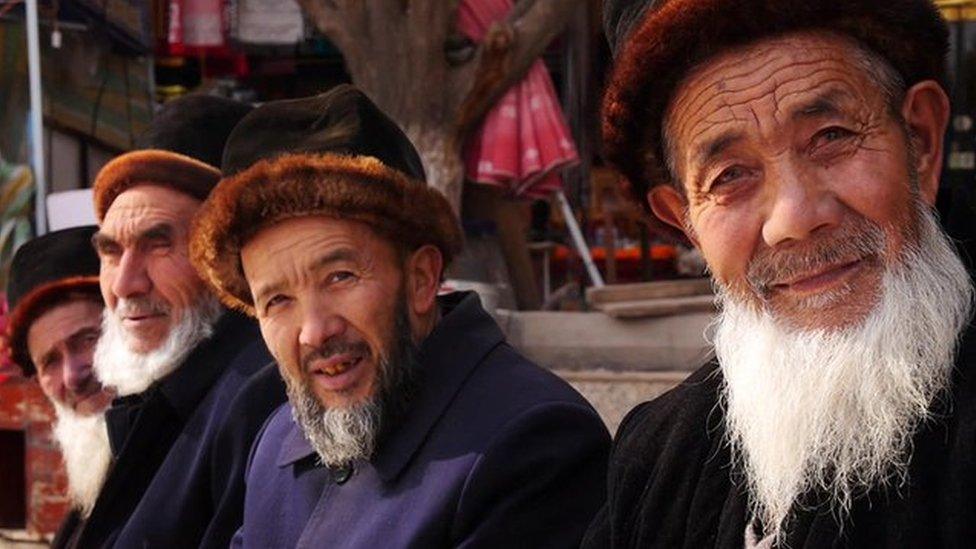
Uighurs are ethnically Turkic Muslims
They make up about 45% of the Xinjiang region's population; 40% are Han Chinese
China re-established control in 1949 after crushing short-lived state of East Turkestan
Since then, there has been large-scale immigration of Han Chinese and Uighurs fear erosion of their culture
Xinjiang is officially designated an autonomous region within China, like Tibet to its south

'Why do you have a beard?'
Turkey is one of the most popular destinations for Uighurs fleeing China.
In 2009, then Deputy Prime Minister Bulent Arinc said there were more than 300,000 Uighurs living in Turkey.
Mehmet Soylemez, a Turkish academic living in China since 2006 said the exodus increased especially in the last two years.
"Uighurs do not lead a comfortable life in China because of restrictions on religious rituals or social inequality.
"Those who feel pressurised or those who have been in and out of prison prefer to leave the country," he said.
A Uighur who moved to Turkey in December 2014 and wished to remain anonymous fearing reprisal from the Chinese authorities, said he experienced "atrocities" first hand.
"Last year, on a holy night in Ramadan almost 50 members of our family gathered to have a meal.
"My daughter came and told me that we were surrounded by soldiers. They detained us, questioned us till early morning. They asked for $1,000 (£650; 905 euros) each to set us free.
"When you sit at your house with four to five friends, when you pray, they break the door and start questioning you.
"'Why do you have a beard? Why are you reciting from the Koran? Why are the women covered?'" they ask.
"Then they put you in prison. They even detained my 10-year-old son with his four friends."
He said he passed through Vietnam, Cambodia, Thailand and Malaysia to reach Turkey.
Now he, his wife and four children live in a flat in Istanbul, with five other families.

The Chinese government has been trying to control religious expression in Xinjiang by imposing rules on the Uighur community.
Critics say it is exacerbating the situation.
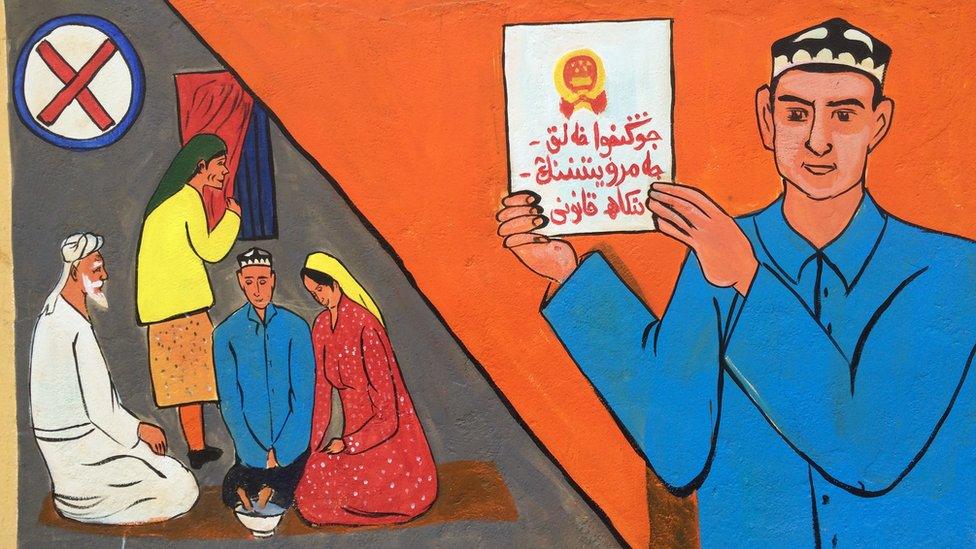
Propaganda murals in Kashgar, Xinjiang, show for example that being married by an imam in secret is against Chinese law
Some controls witnessed in parts of Xinjiang include:
Women forbidden from wearing veils
Uighurs are also not allowed to buy knives in some parts
Praying is strictly regulated. People under 18 are not allowed in mosques
Couples have to apply to the government for a marriage certificate and may not be married in secret by an imam
Only older Uighur men are allowed to have beards

'Miss my country'
Ramadan is a sensitive time in Xinjiang following a rise in attacks blamed by Beijing on Islamist militants over the past two years. Hundreds have died in the violence.
Chinese authorities deny pressurising the Muslim minority in the country.
But the Uighur man said he did not intend to go back.
"I miss my country. It's where I was born, where I grew up.
"But I'm happy in Turkey. I'm free. I can dress however I like. I can conduct my religious rituals. If I ever go back, they will put me in prison immediately," he said.
- Published6 July 2015

- Published2 July 2014
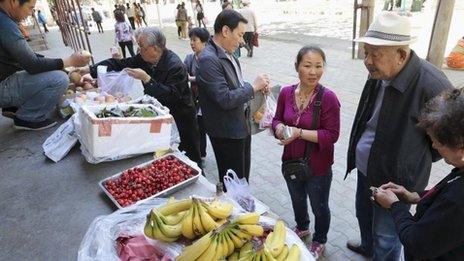
- Published2 January 2015
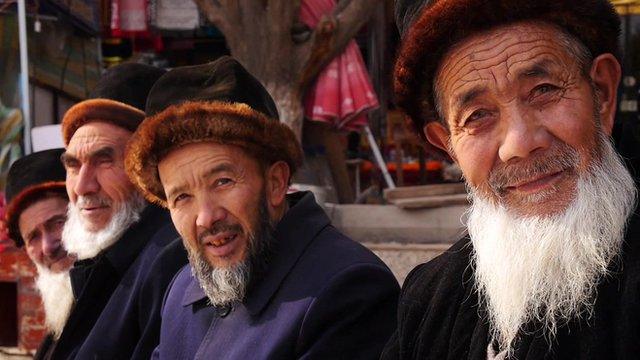
- Published12 January 2015
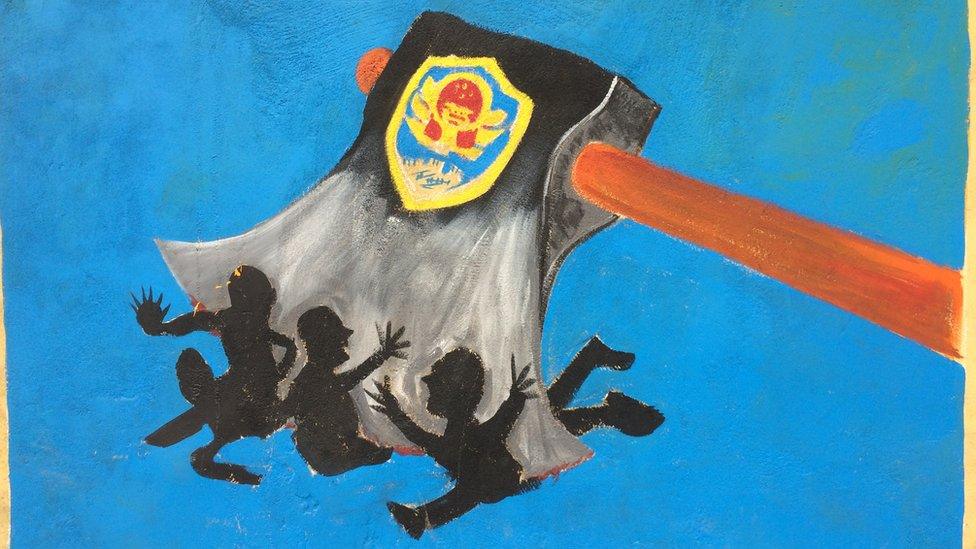
- Published17 June 2015
